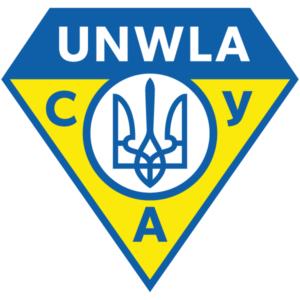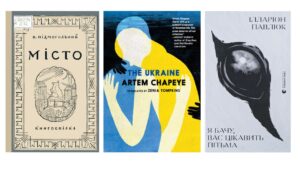 Following up on part one of the interview with the representatives of the Ukrainian National Women’s League of America (UNWLA), the second part continues to advocate and educate the public about Ukraine.
Following up on part one of the interview with the representatives of the Ukrainian National Women’s League of America (UNWLA), the second part continues to advocate and educate the public about Ukraine.
The responses to the interview have been prepared by
- Anna Petelina, Culture and Education Chair, UNWLA branch 143
- Christina Pikhmanets, UNWLA Regional Chair of Education in New Jersey
🇺🇦 🇺🇦 🇺🇦 🇺🇦 🇺🇦 🇺🇦 🇺🇦 🇺🇦 🇺🇦 🇺🇦 🇺🇦 🇺🇦 🇺🇦 🇺🇦 🇺🇦 🇺🇦
BWR: We love your booklists! Not that we can judge the selection in its full context, but these short abstracts really make us want to read many of these books. Or purchase them for our libraries. Do you use publishers’ content, or do you prefer writing your own?
UNLWA: When creating our booklists we strive to provide concise abstracts that capture the essence of each book and spark readers’ interest. To achieve this, we gather descriptions from various sources, including publishers, vendors, and other resources. These descriptions serve as a foundation, offering insights into the plot and themes of the books. Sometimes, we may adjust the language or provide additional context to enhance understanding to make the abstracts more informative. However, our primary aim remains to help readers discover new books they’ll love.
🇺🇦 🇺🇦 🇺🇦 🇺🇦 🇺🇦 🇺🇦 🇺🇦 🇺🇦 🇺🇦 🇺🇦 🇺🇦 🇺🇦 🇺🇦 🇺🇦 🇺🇦 🇺🇦
BWR: As volunteers, you must be spending countless hours selecting and reading books, drafting reviews, putting together websites, sending out news, and reaching out to librarians and their patrons. Those of us passionate about a cause are often asked the question: what’s in it for you? How would you answer the question or how would you explain your perspective as a Ukrainian American to those who are looking for something meaningful to do in their lives?
UNLWA: That’s an excellent question. For me, it’s about making a tangible difference in promoting Ukrainian literature and culture, both within my community and beyond. I feel a strong sense of pride and responsibility to ensure that Ukrainian voices are heard.
Every book recommended and every connection made with libraries presents an opportunity to challenge misconceptions and enhance the visibility of Ukrainian literature in the English-speaking world. Moreover, it’s deeply rewarding to witness the impact of our efforts, whether it’s individuals discovering Ukrainian literature for the first time or the growth of community support and engagement.
What’s ‘in it for me’ is the fulfillment of knowing that I’m contributing to something larger than myself. I would consider it a personal achievement if I can help more Americans understand why Ukrainian readers shouldn’t be made to settle for Russian literature.
🇺🇦 🇺🇦 🇺🇦 🇺🇦 🇺🇦 🇺🇦 🇺🇦 🇺🇦 🇺🇦 🇺🇦 🇺🇦 🇺🇦 🇺🇦 🇺🇦 🇺🇦 🇺🇦
BWR: What kind of relationship does UNWLA have with librarians in Ukraine? How can you support their work?
UNLWA: To answer this question, I would like to rely on the comment provided by my colleague from UNWLA Christina Pikhmanets, Regional Chair of Education in New Jersey.
When the war began, we understood that it would be difficult for everyone, especially educational and cultural institutions, as they do not defend or sustain the country’s economy. Christina was convinced that despite everything, these educational structures, including bookstores and publishing houses, have a defensive and protective function. They are the Ukrainian cultural shield. Since Russian propaganda is not inferior in strength to their missiles, the cultural and educational environment requires significant support.
She began collaborating with the Ukrainian Book Institute and Biblio.center, Ukraine (center for promoting reading) to collectively brainstorm ways to distribute Ukrainian books in the US and worldwide. As a result, in June 2023, after joint work and negotiations, Ukrainian books were included in the WorldCat cataloging system, greatly facilitating librarians’ search for Ukrainian books. In the same year, we began working with the online bookstore Sokolya (sokokya.com), which became a vendor of Ukrainian books in the US. Currently, Sokolya offers lists of Ukrainian books specifically for US libraries.
We are working on a complete list of Ukrainian literature in English translation and are ready to provide it to any library in the US and assist with placing orders.
🇺🇦 🇺🇦 🇺🇦 🇺🇦 🇺🇦 🇺🇦 🇺🇦 🇺🇦 🇺🇦 🇺🇦 🇺🇦 🇺🇦 🇺🇦 🇺🇦 🇺🇦 🇺🇦
BWR: We asked about your strategies to reach broader audiences. How can libraries and librarians help?
UNLWA: Libraries serve as community hubs where people gather for learning, socializing, and cultural enrichment. I see several potential directions for partnership and cooperation.
Librarians can include book lists and bibliographies provided by UNWLA into their library collections, particularly in sections dedicated to Ukrainian studies or Eastern European literature, which is already being done. By making these books available, libraries can facilitate access for individuals interested in Ukrainian heritage and related topics. To raise awareness and attract diverse audiences, librarians can organize joint events, such as author talks, book signings, or cultural festivals.
Furthermore, organizing book clubs, language classes, or storytelling sessions can engage community members and patrons in meaningful dialogues. In terms of educational partnerships, librarians can collaborate with educational institutions, such as schools and universities, to incorporate Ukrainian books (both in Ukrainian and English languages) into curriculum enrichment activities or cultural exchange programs. By integrating these resources into formal education settings, libraries can help foster greater understanding and appreciation of Ukrainian culture and heritage.
🇺🇦 🇺🇦 🇺🇦 🇺🇦 🇺🇦 🇺🇦 🇺🇦 🇺🇦 🇺🇦 🇺🇦 🇺🇦 🇺🇦 🇺🇦 🇺🇦 🇺🇦 🇺🇦
BWR: Finally, if you could recommend a single book, what would that be and why?
UNLWA: It’s a challenging question, and I fear I may disappoint you because I can’t recommend just one book. However, I’d be delighted to share some titles that have influenced me.
First, I’d recommend “The City” by Valerian Pidmohylnyi. Scheduled for English publication in August this year by HURI, this novel is set in the 1920s and marks the first urbanist novel in Ukrainian literature. It follows the journey of a young, ambitious individual from urban areas to the capital, exploring profound philosophical dilemmas along the way. Originally published in Ukrainian in 1928, this work offers a fascinating exploration of the values and aspirations of its protagonist.
Another compelling read is “The Ukraine” by Artem Chapeye. This collection of 26 pieces blurs the lines between nonfiction and fiction, capturing the essence of Ukraine through its tastes, smells, and sounds, its small towns and big cities, its people, and their compassion and indifference, simplicities and complications. With a preface written by the author from the front lines, the book offers engaging, ironic, and brutally real narratives.
“Ya bachu, vas tsikavytʹ pitʹma” (I see that you are interested in darkness) by Illarion Pavlyuk. Although currently unavailable in English translation, this story explores the themes of human indifference and darkness within us. It reflects on being honest with oneself and the price we are willing to pay for forgottenness. This is a story about the value of repentance over peace.
BWR: Thank you for your time. We wish you all the best with your booklists, hopefully soon in a world where muses won’t have to be silent anymore, with reference to “Inter arma enim silent lēgēs,” Latin for “When arms speak, muses are silent.”
Interviewer’s note
Information is power. Access to information is power. Providing access to information is my job as a librarian. I consider sharing resources curated by fellow librarians, i.e., the experts in their field, extremely important, not only as someone who has the power to provide access but also as someone who grew up in an environment with a heavily distorted view of the world around us. I hope our interview and the list of resources will further promote these books to other libraries.
Selected references
- Bring Ukrainian Books To The Library – An extensive list of Ukrainian books available in English translation for readers and librarians with ordering information. Compiled by Anna Petelina.
- Resources for Supporting Ukrainian Language Communities – Created at Washington State University.
- Ukrainian Language Books – A spreadsheet created at Washington State University.
- Library Toolkit – Resources for requesting and ordering Ukrainian Books for US Libraries.
- Modern Ukrainian Literature – A pdf with current titles.
Related posts from Books We Read
- Books We Read About Ukraine
- Arms and Muses: Poets from Ukraine
- Arms and Muses: Poems from Ukraine
- Holodomor Exhibit in Douglass Library
- Pet Therapy: Dogs (Ukrainian edition)
- Pet Therapy: Cats (Ukrainian edition)
- Librarians Speaking: Voices from Ukraine
- InfoLit 101: The War in Ukraine on Social Media

